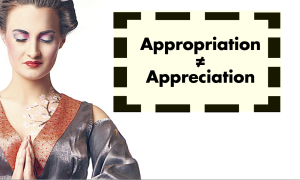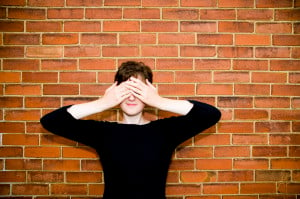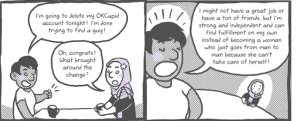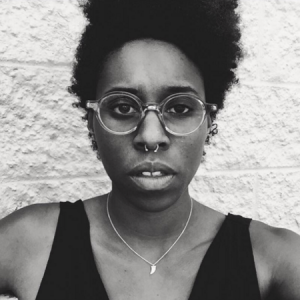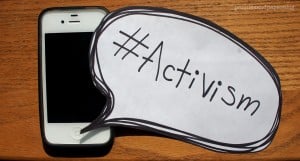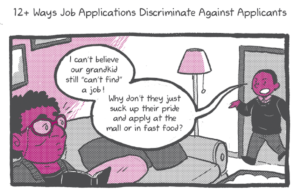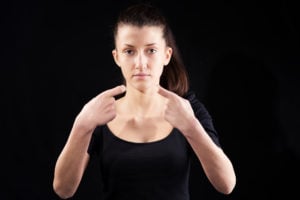
Source: Virgie Tovar
Every Monday at 9:30am Pacific time, you can reliably find me in one place: on Skype.
I might be in front of my terrible Microsoft Surface (Never.Buy.A.Microsoft.Surface.) or my phone, but Monday mornings are dedicated to a meeting of body-positive minds.
I was on one of those Skype phone meetings a few weeks ago. It was a group call – a gathering of women dedicated to people of size through business, service, and general daily ferocity. The conversation went from pregnancy, to lingerie, to athletics. Even though we’re usually an enthusiastic bunch, the theme that tied this conversation together was frustration.
When you – like those of us on this call – work closely with people of size, you quickly realize how absurd, unfair, hurtful, and (at times) dangerous the cultural attitudes, medical negligence, and government-sanctioned shame vigilantism (War on Obesity, I’m looking at you) people of size deal with constantly are.
What I realized was that all of us on the call were baffled, concerned, angry, and frustrated by what the people we worked with (and we ourselves, damn it) had to deal with on the regular.
What is veritably shoved down our throats constantly are the alleged “risks” of being fat. But what is consistently neglected in this “Fat = Death” narrative are the very real ways in which the culture itself creates much of the stress and strains that make fat people’s lives really fucking hard.
So, I wanted to make the whole Internet privy to the conversation that we had because I feel it’s an important one. I even hit up some friends who were not on the call and added them to this article because I wanted more experts to enter this dialogue. So, here it is – your opportunity to be a fly on the wall of our Skype call. Here are six body image experts talking about the effects of fatphobia and the War on Obesity.
1. ‘Health’ Cannot Be Determined Upon Sight
 Louise Green
Louise Green
Fitness Expert
Body Exchange
Since 2005, I have worked exclusively with the plus-population as a personal trainer and health coach. These are my observations after thousands of interactions, along with my own personal experience as a plus-athlete.
When it comes to health and fitness, there is no escaping headlines that include the words “crisis” and “epidemic” that blanket millions of North Americans who fall outside the ridiculous measurement of the Body Mass Index chart.
The Body Mass Index was devised sometime between 1830 and 1850.
Yet this archaic form of metrics has been deciding and judging our position on the health and fitness scale for over a century. And once you enter the higher end of the index, society has decided that all bets are off.
As a result, our conditioned population has systematized people of size into “healthy” and “unhealthy” standards simply by their outward appearances, and this is done without any medical screening or fitness testing that concurs.
So fat people remain highly marginalized by many social conditioned assumptions.
There are no shortages of fitness professionals assuming the primary goal is weight loss without actually asking the client. And physicians assuming that their patients are health risks before there is any metabolic evidence are robotically doling out the standard advice of “Move more, eat less.”
Not only that, but fat people fall into a “Damned if you do, damned if you don’t” equation: We can’t harp on people to move their bodies when we live in a society that shames and judges for any attempts.
Often, when fat people participate in fitness, they’re met with stigma and judgment. The current state of affairs often presents a vicious circle of damnation to the fat population:
- You are unhealthy and unfit, based on nothing but appearance.
- “Move more, eat less,” a standard set of practices.
- “Hey, fatso, eat another burger” call-outs by cars driving by when attempting to exercise.
- Terrible fitness experiences translate into unsustainable motivation (and rightly so – our brains remember that shit).
Judgment around fat people, specifically around health and fitness, is a form of acceptable discrimination blatantly exercised in daily North American life.
2. Everyone Deserves Common Decency
 TaMeicka Clear
TaMeicka Clear
Body-Positive Spirituality and Life Coach
Clear Understanding
As a spiritual, LGBTQIA+ life and body-positive coach, more than three-quarters of my clients are queer women of color that are also people of size.
I work with artists, non-profit employees, mental health workers, and small business owners. A major motivating factor of their having chosen me as a coach is due to my social standing and practices around body love and body acceptance. My clients have goals and aspirations that do not include or center weight loss.
A common theme I notice among my clients is the fight to be respected and taken seriously in their fields due to the social stigma associated with size and work ethic.
They have experienced being targets of unwarranted health advice from non-medical professionals (coaches, mentors, potential clients, or stake holders) and the recipients of harsh criticism from health care providers.
I have several clients that have experienced harassment – including threats and being stalked online and in person due to the stigma around what kind of work and art plus size people are “supposed” to do.
Governmental and social regulations have increased a kind of cruelty and obsession with people like my clients that produce a very hard world to try to navigate.
My clients are verbally accosted, videotaped without their permission, followed by strangers, and harassed in public simply for stepping outside of their door.
3. Care Providers Should Treat Everyone with Respect
 Jen McLellan
Jen McLellan
Birth Advocate
Plus Size Birth
In 1978, the C-section rate for women of all sizes was the same.
Today, plus-size women face a 47.7% C-section rate with the national average being closer to 30%.
Plus-size women’s bodies are no different than they were 35 years ago, but society’s view of fat individuals has changed.
There’s an assumption made by some care providers that fat women are physically incapable of birthing their own babies. Many plus size women are told upon their first prenatal visit that they need a C-section, based only upon their Body Mass Index. And this is counterintuitive – because major abdominal surgery comes with far greater risks for women of size.
Some care providers are even going so far as to tell women their vaginas are too fat for them to be able to give birth. This is being called the “Fat Vagina Theory.” And while it sounds laughable, it’s happening and is incredibly damaging to a woman’s belief in her ability to birth a healthy baby.
Studies show that when a care provider shames a fat patient, they are less likely to receive medical care and more likely to gain weight. There are some increased risks associated with being plus-size and pregnant. However, women of all sizes who are proactive with their health have low risk pregnancies.
So hiring a size-friendly provider can make all the difference in how a woman is cared for throughout her pregnancy and birth.
Being treated with dignity by care providers isn’t something a woman should be hopeful for. It’s something she should expect.
4.Sexy Is for Every Body
 Chrystal Bougon
Chrystal Bougon
Lingerie Goddess
Curvy Girl Lingerie
Fat women are sexual beings. Get over it.
On a daily basis, I encounter a woman who is visibly nervous when she shops at our lingerie store. We do our best to reassure our new customers that they’re shopping in a safe place where we talk daily about sex for large bodies and lingerie for sexy, plus-size bodies. Hopefully, wearing the lingerie leads to lots of hot, crazy, connected, sensual, fat sex. Or as I like to call it: sex.
So, why would any woman have anxiety walking into a shop that focuses on lingerie for women size 12/14 to size 26/28?
Maybe because in our American media, we just do not see sexy, fat bodies. Likely because we have heard for years that sexy is for thin people. Maybe because the few fat women that we do see in the media rarely show any skin or get to play the sexy lead.
Our store focuses on plus sizes only, so one would think that this would be a welcome sight to most plus-size women, right? But maybe not if all you have heard all of your life is that you are “too fat” and “you will be lucky to find a partner with all that weight.”
Sexy is for every body, not just for bodies that are under a size ten.
All bodies are capable of so much pleasure. And all people (men or women) deserve to feel like they are beautiful, sexy beings. I am here to tell you, though, that some days, it sure takes a lot of convincing.
My customers tend to be women over 30 and on average, a size 22/24. Every single one of them is in a different place in her journey to body acceptance and self-love, and we try to respect where they are in their journey.
I wish I had a magic Curvy Girl wand to wave over each of the anxious women who walk through our doors – a magic wand that helps them to understand that their bodies are beautiful and worthy. I want them to celebrate their fat, curvy bodies.
We need that.
5. Healthy Children Come in All Shapes and Sizes
 Jessica Wilson
Jessica Wilson
Dietician
My Kitchen Dietician
I am a dietitian. I see clients age six months to age 66. When I see fat children in my office, I usually get one of two types of parents:
- Parents who want me to food police and berate their child in a way that inspires the child to diet and become thin; or
- Parents who fear that I will blame them because their child is fat and think that they’re “bad” parents or that their child is “wrong.”
When I speak to children of the former parents, I reference the pervasive fatphobic society that we’re surrounded by, which pushes all of us to conform to one – very small – size.
We speak of our individuality and how different bodies are what make this world beautiful and interesting. We focus on eating what their body needs and moving their body in ways that feel good.
With the latter families, I discuss that healthy children come in all shapes and sizes and that focusing on what others think their child should look like will produce children who don’t trust their own bodies, as well as parents who don’t trust their children.
My work with these families is successful if the child doesn’t develop a disordered relationship with food and their body and has nothing to do with weight.
The War on Obesity is distorting children’s relationships with their bodies. It has resulted in children thinking that fat bodies are untrustworthy, shameful, and in need of control. The War has given adults permission to transfer all of our anxieties about our weight onto our children.
Children need to play, not exercise; they need to enjoy eating, not “portion control” or calorie counting. They need to grow up trusting their bodies and knowing that they will sense when to eat more and when to stop eating. Children don’t need conversations about weight and BMI; they need to find their inner awesome.
One of the things that always amazes me about people who consistently throw the “BUT STUDIES SHOW THAT FAT PEOPLE DIE! BUT DOCTORS… BUT VEGETABLES!” arguments at me is their complete – and perhaps willful – ignorance of two key pieces of data:
- In every case study ever known in human history – with the exception of The Walking Dead – everybody dies.
- With the exception of a small minority (n = >10%), the body you have naturally is the body you are likeliest to have throughout your life no matter what you do.
Okay, and here’s a bonus expert opinion: It’s unclear that the measures a person takes to lose weight will not ultimately be more harmful to them than the alleged benefits of that weight loss.
So there.
6. Fat Hatred Affects Us All
 Jes Baker
Jes Baker
Blogger and All-Around Badass
The Militant Baker
I think a mistake that many of us make is in assuming that “fat advocacy” is only for those that live in large bodies – that fat hatred and oppression doesn’t affect anyone else. And boy howdy, is that wrong!
See, fat hatred affects us all.
We live in a culture that humiliates, demonizes, politically oppresses, and (ultimately) socially crucifies fat people. And if we continue to feed into the irrational fear of large bodies (something many of us have or – gasp! – are capable of having), we will continue to help launch body terrorism on all sizes. We will assist in launching shame-based coercion and emotional warfare on everyone, no matter how small or large.
People say: “Okay. Fine, Jes. But why do you focus so much on the body? Why should I care about body terrorism? And why are you so superficial?”
To which I respond:
When we hate our bodies, we put our lives on hold, miss opportunities, feel unlovable, destroy relationships, trigger mental illnesses, develop dangerous eating disorders, and live in a perpetual state of low self-esteem.
But if we were to overthrow fat hatred and oppression, we would improve the circumstances for every person that suffers from the above.
We would suddenly eradicate that vilifying measuring stick of physical success, and our value would no longer be determined by the degrees of separation between our body and a fat one. All bodies would be allowed to exist as is.
Without fat oppression, we would have permission to love ourselves no matter our shape, size, and shade.
This then allows every body grab life by the horns, try new adventures, find fulfilling and intimate relationships, heal their brains, experience happy connections with food, and build an impermeable sense of self-worth.
And, God damn it, isn’t that what life is all about?
***
I found in the reading the words of my friends and colleagues some common threads. To summarize:
- Fatphobia is a serious form of psychological warfare that affects people of all ages and sizes.
- The War on Obesity has emboldened and/or terrorized people into further stigmatizing fat children and adults.
- Social pressure and discrimination are major causes of harmful and potentially life-altering stress in fat people’s lives.
When I think about why I’m committed to the work of ending fat stigma and fat hate, I think back to being a kid myself, no older than five or six. That was when the attack on my fat body began.
My childhood was essentially hijacked by fatphobia, and that experience would have ripple effects in the way I felt about my body – and what it was worth – for years to come.
In thinking about ways to describe the daily fat-shaming I received, I don’t even know how to appropriately convey how it made me feel and how it affected my mental health, my ability to feel joy or pride or safety. Even now, as a full grown woman, I still experience some of the behavior I remember from the playground, out in the world.
I anticipate people commenting on the size of my body, what I wear, what I eat. It seems that more and more, people (and especially women) of all sizes are finding our worlds becoming smaller and smaller as our behaviors become topics of unsolicited public commentary.
Eating in public, wearing form-fitting or bright clothes, or just being perceived as taking up “too much space” are suspicious “acts of aggression” in the War on Obesity the US is waging. Fat people – and people who in any way are not seen as fighting this fight – have become enemies of the public.
The things that have been described above are nothing short of despicable. Fat hatred is a growing reality in daily life. As the culture becomes more hostile to fatness, it is easy to forget that every person deserves the right to a non-pathological (dare I say, beautiful?!) relationship with food and their body.
We cannot forget that these are human rights, not rights reserved for dieting adherents and gym goers alone.
As the public health sector institutionalizes and encourages the policing of bodies, we forget that no one deserves to live a life where they feel that their body defines their access to humanity.
Whatever the alleged “positive effects” that the War on Obesity are meant to yield, they can’t be worth the decreased access to physical movement, a positive and supported pregnancy, a person’s freedom to walk outside their house without being videotaped, sexual pleasure, a child’s right to have a normal relationship with food, our right to love our bodies no matter what size.
[do_widget id=”text-101″]
Virgie Tovar, MA is a Contributing Writer for Everyday Feminism and the editor of the book, Hot & Heavy: Fierce Fat Girls on Life, Love and Fashion. Virgie is one of the nation’s leading experts and lecturers in the areas of fat discrimination and body image. She lives in San Francisco. Find her online at www.virgietovar.com.
About the Contributors
Louise Green is a globally recognized “fit and fat” voice at the forefront of the Body Advocacy movement. With a background in group fitness and personal training as well as a successful career as a Plus Size Athlete, Green is not only the Founder of Body Exchange (with six locations in Canada alone), but is additionally a kick-ass blogger, health and wellness retreat specialist, and advocate with a comprehensive continental reach. Find out more about her and her work here.
TaMeicka L. Clear, who prefers to be called Meicka is a big bodied Black, dyke from Texas residing in Oakland. Meicka is the coach, spiritual practitioner, and creatrix of CLEAR Coaching and Consulting. Meicka’s loves are vibrant high top tennis shoes, ginormous earrings, community/family, and her sweet sweet partner, Merika.
Jen McLellan is a writer and certified childbirth educator who advocates for plus size women. She promotes positive information to empower healthy decision-making during pregnancy. Within her blog, Plus Size Mommy Memoirs, she helps women navigate the world of plus size pregnancy, shares tips for embracing your body, and laughs along with the adventures of motherhood.
Chrystal Bougon is the Owner and Resident of Curvy Girl Lingerie in San Jose. Her store caters to sexy, beautiful women who proudly wear a size 12/14 to size 28/30. Curvy Girl is a safe and comfortable place for fat and curvy women to try on their lingerie and discuss things around fat bodies and sex.
Jessica Wilson is a Registered Dietitian who blogs at My Kitchen Dietician. She holds a Master’s of Science degree in human physiology and has been providing nutrition care in an outpatient setting since 2007. She began her private practice in 2013 to focus more on Health at Every Size® principles.
Jes Baker is The Militant Baker, a fierce body love advocate and founder of the Body Love Conference. She lives in Tucson, Arizona with three cats; all of whom she loves more than anything. Really. Anything.
Search our 3000+ articles!
Read our articles about:
Our online racial justice training
Used by hundreds of universities, non-profits, and businesses.
Click to learn more















